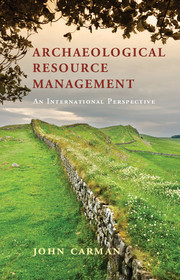Description
Archaeological Resource Management
An International Perspective
Author: Carman John
Archaeological Resource Management provides an international comparison of the main practices involved in managing archaeological remains.
Language: English
Archaeological Resource Management
Publication date: 09-2015
252 p. · 15.9x23.5 cm · Hardback
Publication date: 09-2015
252 p. · 15.9x23.5 cm · Hardback
Archaeological Resource Management
Publication date: 09-2015
252 p. · 15.2x22.8 cm · Paperback
Publication date: 09-2015
252 p. · 15.2x22.8 cm · Paperback
Description
/li>Contents
/li>Biography
/li>
Archaeological resource management (ARM) is the practice of recording, evaluating, preserving for future research and presenting to the public the material remains of the past. Almost all countries uphold a set of principles and laws for the preservation and professional management of archaeological remains. This book offers a critical and comparative perspective on the law and professional practices of managing archaeological remains. Beginning with a global history of ARM, John Carman provides an overview of legal and professional regulations governing ARM today. He then turns to consider the main practices involved in managing archaeological remains, namely, their identification and recording, their evaluation for 'significance', their preservation and their presentation to the public. As a whole, the book offers an overview of what ARM 'does' in the world, with implications for understanding the role of archaeology as a contemporary set of practices that determine how future generations will access material remains of the past.
Part I. History and Principles: 1. Historical antecedents to archaeological resource management; 2. The development of current structures; 3. Systems of regulation; Part II. Practices: 4. Inventory; 5. Evaluation; 6. Preservation; 7. Presentation; Part III. Conclusions: 8. Archaeology in the world.
John Carman is Senior Lecturer in Heritage Valuation at Ironbridge International Institute for Cultural Heritage at the University of Birmingham. His authored works in the field of archaeological resource management include Valuing Ancient Things: Archaeology and Law (1996), Archaeology and Heritage (2002) and Against Cultural Property (2005). He has co-authored Archaeological Practice in Great Britain (2011) and co-edited Managing Archaeology (1995), World Heritage: Global Challenges, Local Solutions (2007), Heritage Studies: Methods and Approaches (2009) and The Oxford Handbook of Public Archaeology (2012).
© 2024 LAVOISIER S.A.S.




